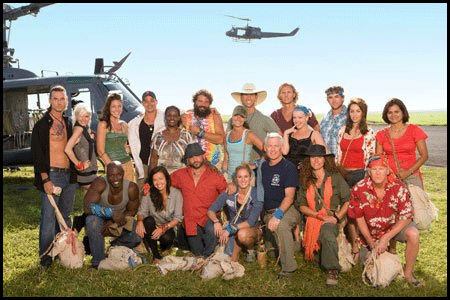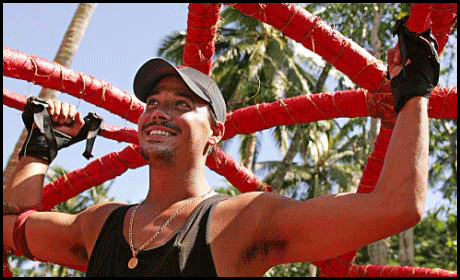We don’t often think of mythic archetypes as something we would apply to our daily lives, especially figures like shapeshifters and tricksters. And yet our own little personal mythologies can shape our social interactions.
I’ve been thinking about this lately, while watching Season 20 of Survivor. Twice a year, this show sends a bunch of people off to some remote location, puts them through a variety of contests and then makes them vote each other out of the game. Because the players all live together in rough camps, the nature and quality of their social behavior can have a big effect on how far an individual may last in the game.

The cast of Survivor, Season 20, Heroes versus Villains
And the game design works in such a way that merely getting to the Final Two or Three is not necessarily an indication of good gameplay on your part: it could be because other players know you are so disliked that if given a choice between you and themselves, the jury (players previously voted out) will not give you the big prize.
Over the years, there have been those who believed that winning at challenges holds the key to winning the whole. Or making big plays to dump athletes or very social players. Some have believed that controlling all actions of their alliances is the winning way. Others choose to stay under the radar, not being too outstanding, or too obnoxious, or too visible in any fashion.

Russell was a Trickster
But the presentation each player makes of his or her self affects these methods. This seems very evident in Survivor‘s Season 20, which was labeled “Heroes versus Villains.” In this case, the players did not choose the labels. And yet, some embraced the designations, some rejected them, and some didn’t care. On an obvious level, Rupert deeply embraced the designation of “hero,” to the degree that he felt himself very reluctant to ally with a so-called “villain.” Colby as well clung to his perception of “playing with honor.” Russell gleefully plowed through players as chief villain (calling himself “king” several times). Coach, who seemed disconcerted to be classed as a villain, set out to play with what he perceived as honor and warrior ethics.
The problem with all this is that the game design of Survivor does not accommodate such self-perceptions. The social aspect of the game ends up ruling the final decisions of the jury, the people who will choose the million dollar winner. Thus, insisting that just being “athletic and winning challenges” won’t help someone who doesn’t get along with his or her tribe-mates. For those who believe they can “play with honor,” the reality is that they will have to break a promise at some point if they want to stay in the game.
The game of Survivor favors those who can operate in the modes of the mythic figures of Tricksters and Shapeshifters.
Tricksters

Parvati was a Trickster
The Trickster, let us remember, is one who punctures illusions, works from the position of being an underdog, and who keeps the sense of humor at hand. Not that the object is to be the “class clown,” but rather to keep the sense of balance in the face of incongruity. Tricksters keep an eye toward the best opportunities for bringing down “the big guys.”
A Trickster knows vividly he or she is at a disadvantage at all times, and so never lets down the guard. If switching alliances or just one vote serves the Trickster, that person will do it. And all the while, the Trickster will work at maintaining public humor, in order to keep the social situation from turning against him.
Shapeshifters
The Shapeshifter, by contrast, is the one who keeps secret some key piece of information. In Survivor, that could be a hidden alliance or possession of a hidden Immunity Idol. Shapeshifters will change voting targets as the game changes.

Rob was a Shapeshifter
A Shapeshifter will change social activity as circumstances change: such as letting someone else “provide food” for a long time, until that person is no longer needed for strategic purposes; as soon as it is an advantage, Shapeshifters will become “providers” (assuming possession of that skill). Another Shapeshifter might hold off in physical challenges until late in the game, when individual immunity is most important.

Sandra was a Shapeshifter
The way to deal with Shapeshifters is either change shapes with those people or to hold onto them until they reveal their “hidden truth.” When applied to Survivor, I suppose that means “be in an alliance with them.”
In Survivor, the game-play of both Tricksters and Shapeshifters can look similar. The nature of the game requires a lot of lying and tricking other players. And yet, there are differences in the way each type goes about these.
Season 20 Tricksters and Shapeshifters
Tricksters tend to run over those who are actively in their way. Russell was notorious for this – if he felt himself crossed or thwarted, he worked to remove that person promptly without waiting. This would involve tricking or persuading other players that his target was a threat in some way. He disrupted Rob’s plans by tricking Tyson into switching his vote (in a split-vote plot designed by Rob that would have put Tyson, Russell and Parvati in a three-way tie: in the re-vote, those three would not themselves vote and Rob’s alliance could then remove either Russell or Parvati easily) to Parvati, whom he then protected with a hidden Immunity Idol, with the result that Rob’s ally Tyson was voted out.
Parvati herself was no slouch at tricky maneuvering. She had played twice previously and won one of those games. Yet, Russell aligned with her seeming to consider her a malleable coat-tail rider. She did warn him she was not such when he told her she could “ride his coat-tails all the way,” but he apparently did not take that seriously. Parvati tricked her own ally, by keeping secret that she had found a hidden Immunity Idol. When the Heroes passed their Immunity Idol to Russell, thinking he was in danger before the merge, he gave it to Parvati at a point where it seemed she was in danger. She used both idols to benefit her own plans rather than Russell, which infuriated him for a bit.
By contrast, as Shapeshifters, Rob and Sandra played by seeming to ally one-to-one with each player they connected with. This can look like playing tricks, but it isn’t quite. With Rob, he would play true with his allies, being what they needed, as long as they held on to him. For Sandra, who had all her alliances peeled away from her, she held onto her one truth: she would not support Russell. Even down to the end, when it was evident that Russell would remove anyone who was not “with him,” when Russell asked her directly if she was with him or against him, she flat out told the truth: “I’m against you, Russell.” She went on to win the season, over the two Tricksters.
Archetypes Playing Survivor
But note, of all the mythical archetypes, these two are best adapted to changing circumstances. They are not the ones who come into the game and stick to a rigid personal mythology. “Heroes,” “villains,” “warriors,” “honorable player,” “pure athlete,” all those personal labels end up tripping the players who cling to them.
As I said, applying mythic motifs to our “real world” lives takes some careful consideration. Real lives tend to be more complicated than “story lives.” And yet, because myth is about meaning, we do, in the end, tend toward the mythic shapes that best convey our “personal meaning.” It’s an interesting prospect to consider. What mythic forms are most important in your life? And how do they become manifested in your lifte?
I’m going to have to go think about this some more. I’ll be interested in anyone’s thoughts about it.
